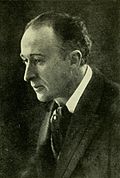Wikipedia:Today's featured article/requests/Frederick Delius
Frederick Delius[edit]
- The following discussion is an archived discussion of the TFAR nomination of the article below. Subsequent comments should be made on the appropriate discussion page (such as Wikipedia talk:Today's featured article/requests). Please do not modify this page unless you are renominating the article at TFAR. For renominations, please add
{{collapse top|Previous nomination}}to the top of the discussion and{{collapse bottom}}at the bottom, then complete a new {{TFAR nom}} underneath.
The result was: scheduled for Wikipedia:Today's featured article/June 10, 2014 by BencherliteTalk 09:16, 20 May 2014 (UTC)
Frederick Delius (1862–1934) was an English composer. Born in the north of England to a prosperous mercantile family, he was sent to Florida in 1884 to manage an orange plantation. Influenced by African-American music, he began composing. After a brief period of formal musical study in Germany from 1886, he embarked on a full-time career as a composer in France, living in Grez-sur-Loing with his wife Jelka. His first successes came in Germany in the late 1890s; it was not until 1907 that his music regularly appeared in British concerts. Thomas Beecham conducted the full premiere of A Mass of Life in London in 1909, staged the opera A Village Romeo and Juliet at Covent Garden in 1910, mounted a six-day Delius festival in London in 1929, and made gramophone recordings of many works. After 1918 Delius began to suffer the effects of syphilis, became paralysed and blind, but completed some late compositions with the aid of Eric Fenby. His early compositions reflect the music he had heard in America and Europe; later he developed a style uniquely his own. The Delius Society, formed in 1962, promotes knowledge of his life and works, and sponsors an annual competition for young musicians. (Full article...)
- Most recent similar articles: 25 October, George Bizet (Later note: Jane Joseph, 31st May, for the 140th anniversary of her birth. BencherliteTalk 16:28, 13 May 2014 (UTC))
- Main editors: Brianboulton, Tim riley
- Promoted: 2011
- Reasons for nomination: 80th anniversary of his death
- Support as nominator. Gerda Arendt (talk) 20:59, 24 April 2014 (UTC)
- Support, most high grade quality improvement project by Brianboulton and Tim riley. — Cirt (talk) 21:07, 24 April 2014 (UTC)
- Support per above. Montanabw(talk) 17:18, 6 May 2014 (UTC)

